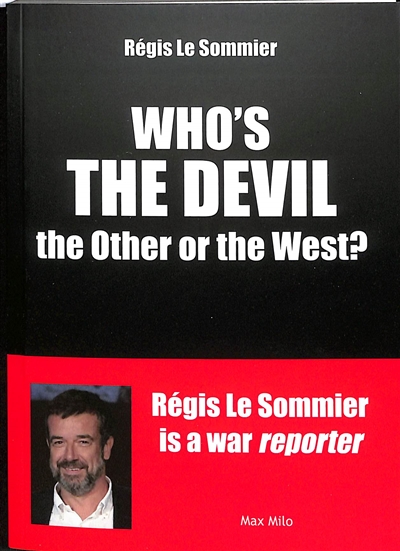en savoir plus

Carte fidélité
Permet à tous ses détenteurs d'obtenir 5% de réduction sur tous les livres lors du retrait en magasin (réduction non cumulable avec les réductions de type étudiant).
Offre également un certain nombre d'avantages auprès de nos partenaires.
Wishlist
Avec les favoris, retrouvez dans un espace les sélections effectuées au fur et à mesure de vos navigations dans le site.
Constituez pour votre usage personnel vos listes de livres en prévisions d'achats futurs et votre sélection d'articles, dossiers, événements, vidéos ou podcasts préférés ou à découvrir plus tard...
Il suffit simplement de cliquer sur "Ajout Favori" sur chaque page qui vous intéresse pour les retrouver ensuite dans votre espace personnel.
Requiert un compte Mollat
Mes Alertes
Requiert un compte Mollat
Who's the devil : the other or the West?
Auteur : Régis Le Sommier
en savoir plus
Résumé
Grand reporter de guerre, l'auteur analyse la notion du diable et la difficulté pour un journaliste de côtoyer des personnalités controversées, impliquées dans les conflits contemporains. Il livre également un plaidoyer pour le journalisme et regrette que la communication de guerre le remplace trop souvent. ©Electre 2025
Lire la Quatrième de couverture
Réduire la Quatrième de couverture
Who's the devil the other or the west ?
« We've spent nine trillion dollars bombing the Middle East like mad. We've sown death there, including our own. And what has it gotten us ? Nothing. »
Donald Trump, November 1,2024.
The figure of the devil has haunted our collective consciousness since the dawn of time. He structures our societies, whether religious or secular. Sometimes, the devil has been a friend before being « demonized ». Sometimes, by force of circumstance, he has become an ally. And sometimes, the devil must be eliminated to mask or even justify the errors of our societies.
Thus, during the Second World War, we made a pact with Stalin to bring down a devil deemed more formidable : Hitler. In Northern Ireland, the British ended up talking with representatives of the IRA, just as the French did a few years earlier with the Algerian FLN. Recently, the Americans negotiated with the Taliban, another terrorist group, before handing over the keys to Afghanistan. Saddam Hussein, Muammar Gaddafi and Bashar al-Assad were friends of the West before the latter precipitated their downfall, even if it meant causing chaos in their countries.
Régis Le Sommier has been a war reporter for 27 years, and has himself interviewed a number of infamous figures. His aim is to revisit the concept of the devil in the light of recent and current conflicts, in order to answer one question : shouldn't the deleterious consequences of geopolitics conducted « in the name of good » lead us to doubt the validity of the actions taken by our governments, even today, against those they like to refer to as devils ?
Fiche Technique
Paru le : 25/04/2025
Thématique : Sociologie des médias
Auteur(s) : Auteur : Régis Le Sommier
Éditeur(s) :
Max Milo
Collection(s) : Non précisé.
Série(s) : Non précisé.
ISBN : 978-2-315-02254-0
EAN13 : 9782315022540
Reliure : Broché
Hauteur: 21.0 cm / Largeur 15.0 cm
Épaisseur: 2.0 cm
Poids: 280 g
